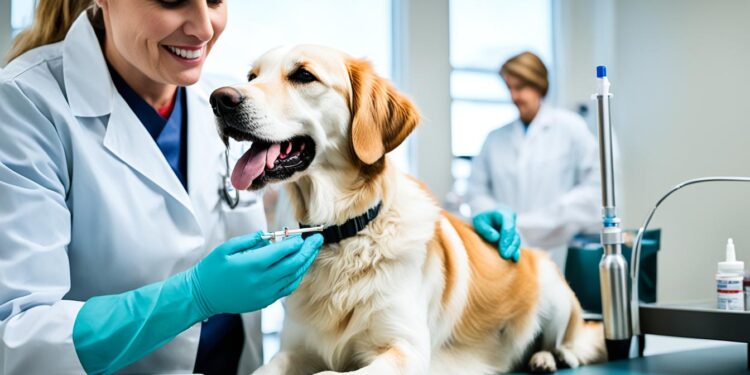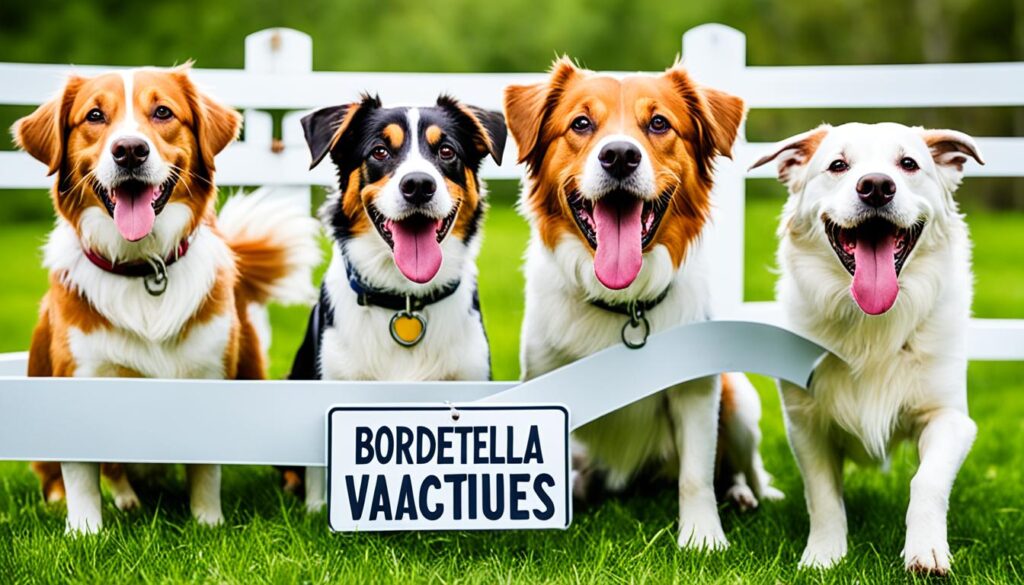Bordetella Vaccines: Guarding Against Kennel Cough

Did you know that kennel cough affects millions of dogs worldwide every year?
Kennel cough, also known as infectious tracheobronchitis, is a highly contagious respiratory illness that can cause severe discomfort and distress to our furry friends. One of the leading causes of kennel cough is a bacteria called Bordetella bronchiseptica. To protect dogs from this airborne threat, veterinarians recommend the Bordetella vaccine.
The Bordetella vaccine is not a core vaccine, meaning it is not administered to all dogs. However, for dogs frequently exposed to other dogs in social settings or canine facilities such as dog parks, boarding facilities, or training classes, this vaccine is essential in safeguarding their health and well-being.
Let’s explore more about the importance of the Bordetella vaccine in preventing kennel cough and maintaining dog health.
Understanding Kennel Cough and Bordetella
Kennel cough, also known as infectious tracheobronchitis, is a respiratory illness that affects the upper airways of dogs. It is characterized by a harsh, honking cough, often accompanied by sneezing and a runny nose.
This highly contagious disease spreads through airborne droplets or direct contact with infected dogs or contaminated objects. Bordetella bronchiseptica, a common bacteria, is the primary culprit behind kennel cough in dogs.
The terms “kennel cough” and “Bordetella” are often used interchangeably to refer to both the disease and the vaccine. While kennel cough is usually not serious, it can progress to pneumonia in puppies or dogs with weakened immune systems.
The Bordetella vaccine is designed to protect dogs against Bordetella bronchiseptica and other common causes of kennel cough. Vaccinated dogs are more likely to experience only mild illness if they contract kennel cough.
| Bordetella bronchiseptica | Kennel Cough |
|---|---|
| Most common bacteria responsible for kennel cough | Affects the upper airways of dogs |
| Can be prevented by the Bordetella vaccine | Highly contagious and spreads through airborne droplets or direct contact |
| Mild illness in vaccinated dogs | Harsh, honking cough accompanied by sneezing and a runny nose |
| No severe reactions to the vaccine | Can progress to pneumonia in puppies or immunocompromised dogs |
Who Needs the Bordetella Vaccine?
Dogs who are social or regularly exposed to other dogs should consider getting the Bordetella vaccine. This vaccine is especially important for dogs who frequently engage in social activities and visit places such as dog parks, doggy daycare centers, grooming appointments, boarding facilities, training classes, and dog shows.
While indoor dogs who have minimal contact with other dogs may not require the vaccine, it is always best to consult with a veterinarian to assess your dog’s individual needs and make personalized recommendations.
Many boarding, grooming, and training facilities may require proof of Bordetella vaccination for dogs to enter. This helps to ensure the safety and well-being of all dogs in these environments.
The airborne nature of kennel cough increases the risk of infection in crowded spaces with close proximity between dogs. Even if your dog is vaccinated, there is still a possibility of contracting kennel cough from other sources. This is because kennel cough can be caused by various bacteria and viruses, not just the Bordetella bronchiseptica bacteria.
To reduce the risk of kennel cough and protect your dog, the Bordetella vaccine is an important preventive measure. However, it’s important to remember that vaccination alone does not guarantee complete immunity from the disease. Regular veterinary check-ups, adherence to vaccination schedules, and responsible socialization practices are essential for maintaining your dog’s respiratory health.

Bordetella Vaccine: A Key Protection for Social Dogs
Dogs are naturally social animals, and many of them thrive on interactions with other dogs. However, socializing with other dogs also comes with certain risks, including the potential for contracting contagious diseases like kennel cough. The Bordetella vaccine is specifically designed to protect social dogs from the risks associated with kennel cough.
When dogs come into contact with each other in settings like dog parks, doggy daycare centers, grooming appointments, boarding facilities, training classes, and dog shows, they are at an increased risk of exposure to kennel cough. This highly contagious respiratory illness can spread rapidly in crowded places where dogs interact closely with one another.
The Bordetella vaccine helps to reduce the severity of symptoms if your dog does contract kennel cough. By vaccinating your dog, you are taking a proactive step towards safeguarding their health and preventing the spread of this respiratory disease.
It’s important to note that the Bordetella vaccine is not a one-size-fits-all solution. The decision to vaccinate your dog should be made in consultation with a veterinarian who can assess your dog’s lifestyle and risk factors. They can provide personalized recommendations based on your dog’s specific needs.
Remember, even vaccinated dogs can still contract kennel cough from other sources. Therefore, in addition to vaccination, it is crucial to practice responsible socialization and hygiene measures to minimize the risk of disease transmission.
Conclusion
The Bordetella vaccine is a crucial tool in safeguarding dogs against kennel cough, a highly contagious respiratory illness. For dogs who frequently come into contact with other canines in social settings or canine facilities, vaccination is strongly recommended. By administering the vaccine, we can reduce the severity of symptoms if a dog contracts kennel cough.
It is important to follow the Bordetella vaccine schedule, which typically includes an initial series of vaccinations followed by booster shots to maintain continued protection. Veterinarians offer various forms of the vaccine, such as intranasal, oral, or injectable options, catering to the unique needs and preferences of each dog.
While mild side effects like sneezing or mild discomfort may occur, serious reactions are rare. It is crucial to consult with a veterinarian to determine the appropriate vaccination protocol based on your dog’s lifestyle and specific risk factors. Regular veterinary check-ups and adherence to vaccination schedules are vital for ensuring a healthy respiratory system in dogs.
Protect your four-legged companion’s well-being by discussing the Bordetella vaccine with your veterinarian today. Investing in preventative measures like vaccination can help keep kennel cough at bay and promote overall dog health.






